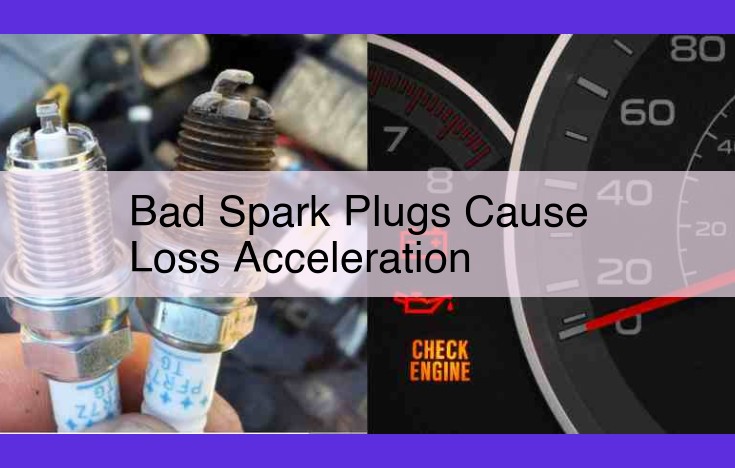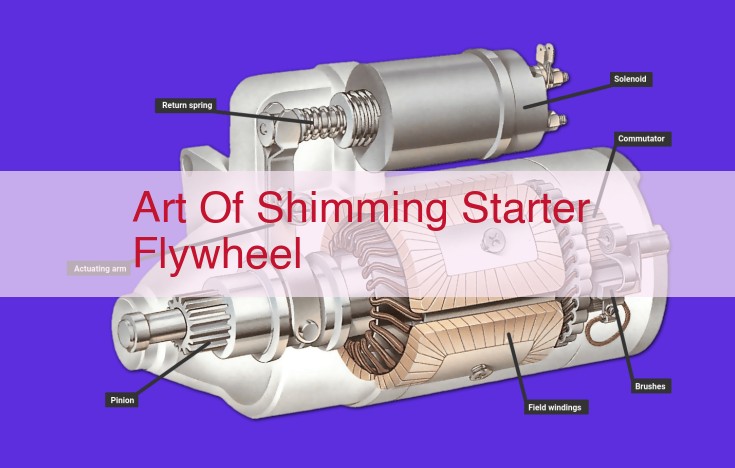Bad spark plugs significantly impair vehicle acceleration due to misfiring and poor ignition. Misfiring occurs when faulty plugs disrupt the ignition process, leading to incomplete fuel combustion, while poor ignition results from weak spark plugs, hindering the engine’s ability to ignite the air-fuel mixture effectively. This results in reduced power output and hesitation during acceleration. Additionally, bad spark plugs can cause vacuum leaks, affecting the engine’s air-fuel ratio and further compromising acceleration.
The Importance of Spark Plugs in Vehicle Ignition
In the heart of your vehicle’s combustion engine, tiny but mighty spark plugs ignite the fuel, setting the stage for power and motion. These unsung heroes play a pivotal role in the ignition process, ensuring a smooth and efficient ride.
Spark plugs consist of several key components, including the spark gap, which determines the distance between the center and side electrodes. This gap is crucial for generating the intense heat required for ignition. The timing of the spark is equally important, ensuring that it occurs at precisely the right moment in the combustion cycle. Finally, the energy provided by the spark plug affects the strength and duration of the ignition, ultimately impacting engine performance.
By understanding the importance of spark plugs, you can appreciate their role in keeping your vehicle running smoothly and effectively.
Recognizing the Signs of Bad Spark Plugs: Loss of Acceleration
- Identify loss of acceleration as a common symptom of faulty spark plugs.
- Explain how misfiring, poor ignition, and vacuum leaks can lead to this issue.
- Mention the potential role of a clogged fuel filter in contributing to acceleration problems.
Recognizing Loss of Acceleration: A Symptom of Faulty Spark Plugs
Your car’s engine is a finely tuned machine, and each component plays a vital role in its efficient operation. Spark plugs are small but mighty components that initiate the combustion process, allowing your engine to produce power. When spark plugs malfunction, it can lead to a variety of performance issues, including loss of acceleration.
One of the most common causes of acceleration problems is misfiring. This occurs when one or more spark plugs fail to ignite the air-fuel mixture in the combustion chamber. Misfiring can result from worn or damaged spark plugs, faulty ignition coils, or clogged fuel injectors. When misfires happen, the engine loses power and the vehicle may hesitate or jerk when you try to accelerate.
Another potential cause of acceleration loss is poor ignition. This can be due to weak spark plugs that aren’t providing enough energy to ignite the fuel mixture. It can also be caused by a weak battery, a faulty alternator, or a clogged air filter. If the ignition system is not functioning properly, the engine won’t be able to produce the power it needs to accelerate.
In some cases, a clogged fuel filter can also contribute to acceleration problems. A dirty fuel filter restricts the flow of fuel to the engine, which can lead to a loss of power and hesitation during acceleration.
Don’t Ignore the Warning Signs
Loss of acceleration is not only a frustrating issue but can also indicate more serious problems with your engine. If you notice your car is struggling to accelerate, it’s important to have it checked by a qualified mechanic as soon as possible. Ignoring faulty spark plugs can lead to increased emissions, reduced fuel efficiency, and premature wear on critical engine components. By addressing the problem early on, you can save yourself time, money, and potential engine damage.
Regular Maintenance is Key
The best way to prevent acceleration problems caused by faulty spark plugs is to replace them regularly. Spark plugs typically have a lifespan of 30,000 to 60,000 miles, depending on the type of plug and the vehicle’s driving conditions. Refer to your vehicle’s owner’s manual for the recommended replacement interval.
By following these simple tips, you can ensure that your spark plugs are always in good condition, providing you with optimal engine performance and a smooth, responsive ride.
Misfiring: Unraveling the Consequences of Faulty Spark Plugs
In the intricate symphony of your vehicle’s engine, spark plugs play a vital role, generating the spark that ignites the fuel mixture. However, when these essential components falter, the engine’s rhythm can falter too, leading to a potentially serious issue known as misfiring.
Misfiring Unraveled
Misfiring occurs when the ignition spark fails to ignite the fuel mixture in one or more cylinders. This disruption causes a loss of power, rough idling, and increased emissions. The effects can be far-reaching, affecting not only the spark plugs but also ignition coils, fuel injectors, and even the air filter.
Causes and Effects of Misfiring
The causes of misfiring are varied, but faulty spark plugs are a common culprit. Other potential causes include:
- Worn-out ignition coils that fail to provide enough voltage
- Clogged fuel injectors that restrict fuel flow
- A dirty air filter that reduces airflow to the engine
Misfiring can have numerous consequences, including:
- Reduced engine power and acceleration
- Rough idling and stalling
- Increased fuel consumption due to incomplete combustion
- Elevated emissions as unburned fuel escapes into the exhaust system
Timely Intervention: The Key to Prevention
Ignoring misfiring can lead to further engine damage, so it’s crucial to address the issue promptly. Here are some essential steps to take:
- Diagnosis: Use a diagnostic tool or have a mechanic inspect the engine to identify misfiring cylinders.
- Spark Plug Inspection: Check the condition of the spark plugs. Worn or fouled plugs need to be replaced.
- Other Component Inspection: Examine the ignition coils, fuel injectors, and air filter for signs of damage or blockage.
- Repair: Replace faulty components as needed and ensure that the ignition system is functioning correctly.
By taking these steps, you can restore your engine’s smooth operation, prevent further damage, and ensure a safer and more efficient driving experience. Remember, misfiring is a telltale sign of spark plug issues; heeding its warning can save you time, money, and engine headaches in the long run.
Poor Ignition: A Result of Faulty Spark Plugs
Faulty spark plugs can cause poor ignition, which can lead to a range of problems for your vehicle. Imagine this: you’re driving down the road, and suddenly your car starts to sputter and lose power. You pull over and check under the hood, but everything seems fine. What could be the problem? It could be your spark plugs.
How Spark Plugs Affect Ignition
Spark plugs are responsible for igniting the air-fuel mixture in your engine’s cylinders. When the spark plugs are faulty, they may not be able to produce a strong enough spark to ignite the mixture properly. This can lead to poor ignition, which can cause a number of problems, including:
- Engine misfires: Misfires occur when one or more cylinders in your engine fail to fire properly. This can cause your engine to run rough and lose power.
- Reduced fuel efficiency: Poor ignition can also lead to reduced fuel efficiency. When the air-fuel mixture is not ignited properly, it can cause your engine to run lean, which can waste fuel.
- Increased emissions: Poor ignition can also lead to increased emissions. When the air-fuel mixture is not ignited properly, it can produce harmful pollutants, such as carbon monoxide and hydrocarbons.
Identifying the Problem
If you’re experiencing any of the problems listed above, it’s important to have your spark plugs checked. A mechanic can use a spark plug tester to determine if your spark plugs are faulty. If they are, you’ll need to replace them.
Replacing Spark Plugs
Replacing spark plugs is a relatively simple and inexpensive repair. It’s something that you can do yourself if you have the right tools and a little bit of mechanical know-how. However, if you’re not comfortable working on your own car, you can take it to a mechanic to have the spark plugs replaced.
Preventing Poor Ignition
The best way to prevent poor ignition is to replace your spark plugs regularly. Most manufacturers recommend replacing spark plugs every 30,000 to 60,000 miles. You may need to replace them more often if you drive in a lot of stop-and-go traffic or if you use a lot of low-quality fuel.
By following these simple tips, you can help prevent poor ignition and keep your vehicle running smoothly.
Engine Damage: The Grave Consequences of Ignoring Bad Spark Plugs
Neglecting faulty spark plugs can have catastrophic consequences for your vehicle’s engine. As we discussed earlier, misfiring, a direct result of bad spark plugs, can lead to a cascade of problems.
Increased Emissions: Misfiring engines produce unburned fuel, which escapes through the exhaust system. This not only reduces fuel efficiency but also contributes to air pollution.
Reduced Fuel Efficiency: When spark plugs fail, the engine struggles to ignite the air-fuel mixture efficiently. This results in poor combustion, leading to reduced power and increased fuel consumption.
Premature Wear: The constant misfiring caused by bad spark plugs puts unnecessary stress on various engine components, including pistons, cylinders, and valves. This accelerated wear can drastically shorten the lifespan of your engine.
How to Prevent Engine Damage
To prevent these dire consequences, it’s crucial to regularly maintain your spark plugs. Replacing them as recommended by your vehicle’s manufacturer can ensure optimal engine performance and longevity.
Remember, ignoring bad spark plugs is not an option. The potential cost of engine repair far outweighs the modest expense of timely spark plug replacement. By taking proactive measures to maintain your vehicle’s ignition system, you can safeguard your engine and enjoy a smooth, reliable ride for years to come.




